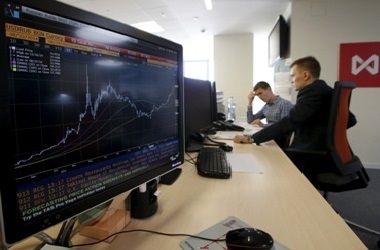Russian equity derivatives volumes have cratered as a result of sanctions, plummeting oil prices and general emerging markets malaise, but Moscow-based broker, BCS Global Markets, is betting on a revival.
The firm is scaling up flow operations in London and New York with an eye to becoming the top market-maker in listed and over-the-counter products for international clients, hoping to grab market share from international banks that have stepped back and local rivals that have been cut off from international clearing services.
“At the moment, international clients look to access certain Russian derivatives instruments mostly through international banks, but we believe we can offer better liquidity, which stems from our Moscow operations, and enable clients to get much better pricing,” said Matthieu Ressencourt, head of equity derivatives trading at BCS Global Markets in London.
“We hope to cement our leadership position in futures, options and ETFs market-making, through offering a full equity derivatives business for Russian markets in London, New York and Moscow.”
Last year the firm rose to the top of the clearing member rankings for equity derivatives traded by its domestic clients on the Moscow Exchange. It has also garnered around a 10% market share in Russian derivatives products listed on Eurex and the London Stock Exchange’s derivatives platform.
The expansion comes as many of its rivals step back. Domestic players including Sberbank, VTB, Alfa Bank and Otkritie all cut London headcount last year as they scaled back international ambitions in response to sanctions imposed on certain businesses by the US and European Union in 2014. Meanwhile, international players have refocused on more liquid markets, cutting emerging market specialists from equity derivatives flow desks as activity in some products came to a standstill.
“Index and single stock futures and options were very liquid before the sanctions and if we do see any softening, we think liquidity could return very quickly,” said Ressencourt.
Any hopes for a near-term change in the political backdrop suffered a blow earlier this month after the US extended its sanctions by one year to March 2017, imposed over Russia’s involvement in the Ukraine conflict. Many believe that the EU will follow suit.
Liquidity shift
Without a political trigger there could still be growth opportunities, traders say. The slump in activity has been largely limited to single stock contracts and alongside the decline, margins have shifted wider.
In February of this year, LSE’s derivatives platform traded 39,000 options contracts with notional value of US$41m across seven Russian names – a sharp decline from February 2014 when 951,000 contracts traded with notional value of US$775m.
Still, index contracts remain buoyant. US-dollar denominated RDX index futures traded 54,000 contracts on Eurex in February, up 10% on a year earlier.
RDX options on the Frankfurt-based bourse more than doubled year-on-year to 60,000 contracts in February, but activity remains almost half the 113,000 contracts that traded in February 2014.
“There’s still decent liquidity in index options” said Ressencourt.
The shift in liquidity from single names, which once represented 70% of the total market, reflects an evaporation of corporate trades that dominated between 2003 and 2009 as Russian oligarchs raised financing against their strategic stakes.
Oil impact
There have been other drivers such as the relatively narrow scope of the RDX index which began trading on Eurex in futures and options format in 2012. The benchmark covers just 25 dollar-denominated depository receipts on Russian stocks with the top three accounting for almost 50% of the index.
Slumping oil prices have also kept many traders at bay as many investors view the contracts as a commodity play.
“Over the last two years, Russia has become a macro story surrounding sanctions and oil, and it has been progressively under-owned by investors,” said an equity flow trader at a US house.
Activity from international investors currently focused around short-term opportunistic and tactical plays, such as three-month expiry call spreads or butterflies around specific events.
But a big retracing in the oil price and any easing of political concerns could drive activity multiple times higher, traders believe, as global macro hedge funds step in with large upside bets.
“Russia went from being loved to being unloved very quickly and that can reverse just as quickly,” said the trader. ”It’s possible it could happen this year, but it needs the oil price not to be moving 10% to 15% a week.”
